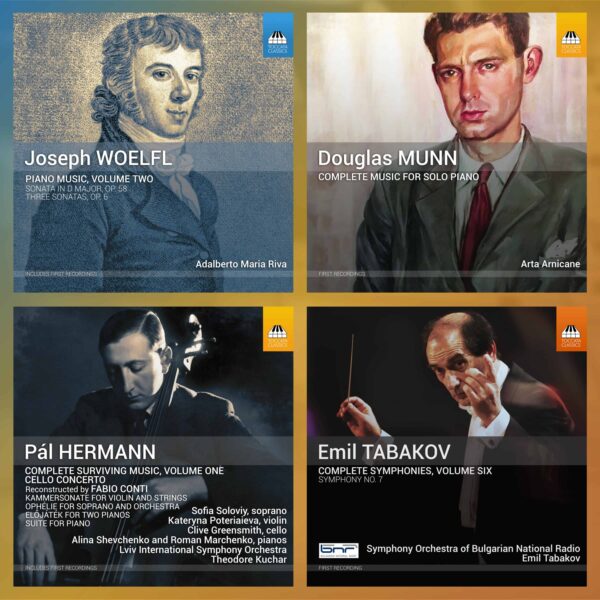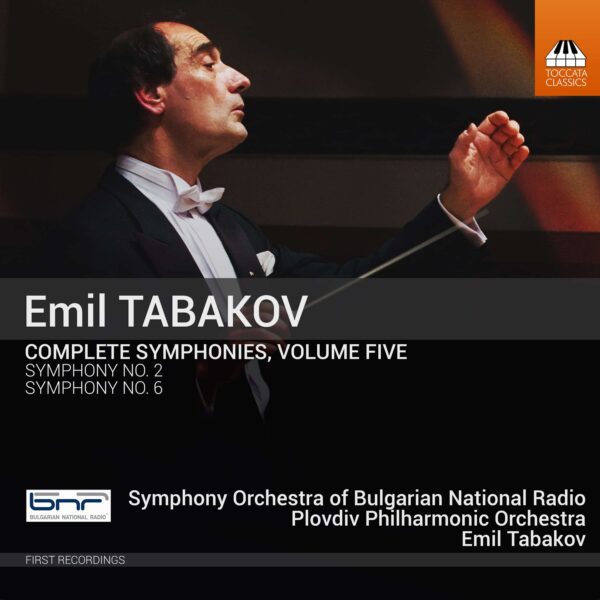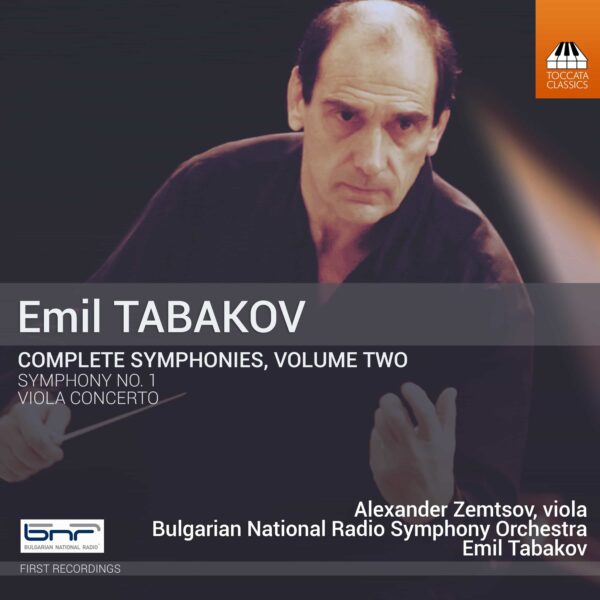Emil Tabakov: Complete Symphonies, Volume One
The Bulgarian Emil Tabakov (b. 1947) follows in the footsteps of such musicians as Gustav Mahler and Richard Strauss, being active as both composer and conductor. Like Mahler, he prefers to write for large forces and now has nine symphonies to his name. Again like Mahler, Tabakov’s symphonies explore the darker side of the human spirit in epic scores as austere as they are powerful. In the atmospheric and expansive Symphony No. 8 (2007–9), the dynamism suppressed in the first two movements is released in a cathartic discharge of energy in the finale. The ebullient Five Bulgarian Dances provide a complete contrast, taking Balkan folk-rhythms as the basis for their pile-driving vigour.
Bulgarian National Radio Symphony Orchestra
Emil Tabakov, conductor
Listen To This Recording:
-
Five Bulgarian Dances (2011)
- No. 1 Moderato
- No. 2 Presto
- No. 3 Allegro Molto
- No. 4 Moderato
- No. 5 Allegro molto
- I Largo
- II Largo
- III Presto
Symphony No. 8 (2007-2009)
First Recordings





Jason Gillepie :
I had never heard of Emil Tabakov before finding this CD. The Bulgarian Dances which start the CD are pulse-pounding, rhythmic and melodic meat and potatoes. They make the heart race with excitement ad thrill with his minor key-inflected tunes. It is hard to believe they were written in 2011 and not 1911, revealing Tabakov’s mastery of form, musical expression, and love for his native land and its music.
Symphony No. 8 is, as the description above notes, a dark work full of pathos. The opening two movements last for nearly half an hour and both are marked Largo. The first movement builds into ever louder and louder exclamations of its ten-note motif (which itself is a 5-note call and 5-note response) as if it were some titanic eldritch horror pushing itself up from beneath the once solid ground. The second movement is quiet but feels restrained; it does not drain the energy so much as hold it in as its mysterious wanderings and musings leave us wondering. The finale explodes into action in, as the description notes, a cathartic manner, releasing everything that had been built up. Moments of quiet interject, but the energy and violence returns battering away until it is finally spent and the Symphony limps quietly along to its end. I do not know if it is a resolution or a resignation. In either event,we have born witness to a titanic eruption of aural power darker than anything in Mahler’s output.
I see that this is a Volume One in his Complete Symphonies. I will be eagerly snatching up the remaining Volumes when they are released. Let us hope that this collection will also include his many Concertos and other orchestral works and that Emil Tabakov will not stop with only nine Symphonies.
Michael Keyton :
Emil Tabakov is one of the more exciting composers of today. I first encountered his music from a BBC broadcast of his wonderful Requiem, which is very high on my list of desired works to be recorded. Subsequently, I found his 3rd Symphony on Balkanton, the superb Concerto for Orchestra on Gega, several concertos on Naxos and Gega. His music has great variety in rhythmic passages and harmonic structures. This symphony is considerably more tranquil than the other works of his I have heard. There are numerous sections that on repeated listening provide good insight into his compositional methods. It lacks the turbulence of his early works, remaining at a more interesting contemplative mood. Having heard broadcasts of his other symphonies, I look forward eagerly to the completion of this series, especially the 4th Symphony with its exciting Rumanian (Bulgarian) inspired dance movement. I hope Toccata Classics will also record the Requiem. It is a large work showing its legacy to Berlioz and Verdi.
MusicWeb International :
‘Toccata continue their sterling efforts in giving us neglected music from the past and the works of contemporary composers who still keep faith with the harmonic past without being slaves to it. […] [His works] are very enjoyable and often hypnotic but not facile […]
Symphony No. 8 is music with something individual to say and though it’s not always a comforting message or an easy listen, I found it well worth hearing. […]
With the composer at the helm the performances are de facto authoritative. The Bulgarian National Radio Symphony Orchestra […] play very well for him. […]
It’s all too rare to find a contemporary composer who doesn’t try to batter the listener into submission, so I look forward to the other albums in this series as they appear. They also have several new recordings of their other speciality, earlier music, which I hope to explore.’
—Brian Wilson, MusicWeb International